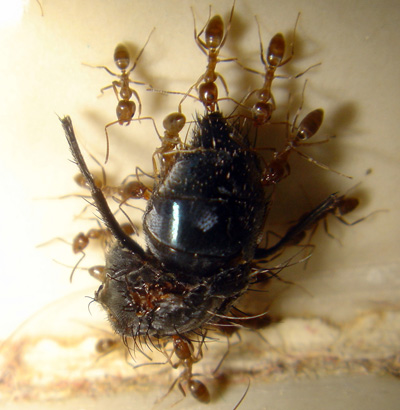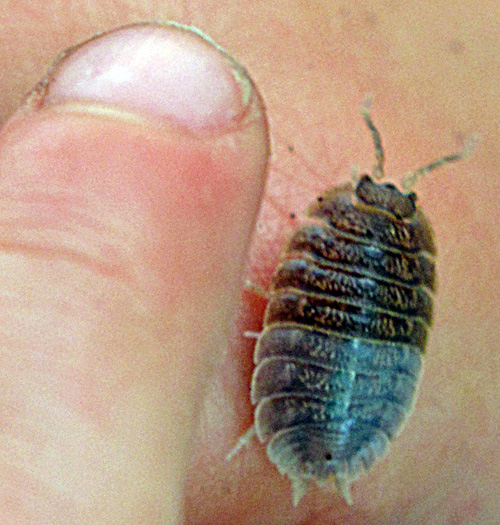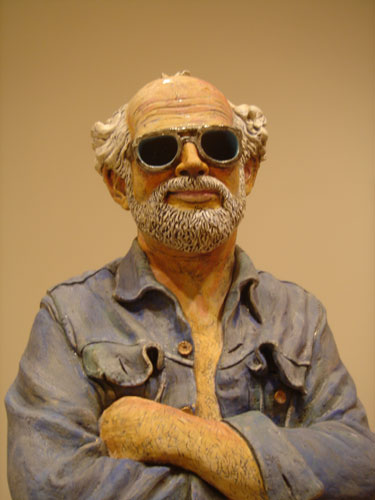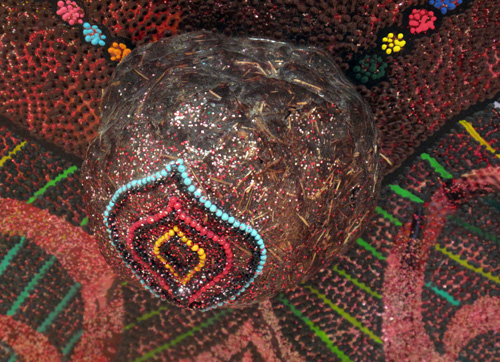The Latest from Boing Boing |  |
- Scholarship of social influence
- Ants
- Elephant Dung and More!
- Mister Jalopy's bike sale at Coco's in Los Angeles
- Plastics industry releases anti-cloth-bag FUD study
- School newspaper archives go online, embarrassing student writing and shenanigans become permanent record
- Kid keeping a lending library of banned books in his her locker
| Scholarship of social influence Posted: 24 May 2009 11:10 PM PDT On the Data Mining blog, an intriguing set of notes from talks on social influence by Duncan Watt and Jon Kleinberg at the International AAAI Conference on Weblogs and Social Media: 3. Diffusion of information may 'long circuit' the small worlds of social networks. In Kleinberg's presentation regarding the study of the largest internet chain mail (a petition) he described the role of the threshold model of diffusion in which we require multiple receipts of a stimulus (e.g. a chain mail letter) to pass it on, we are more sensitive to our immediate community - our strong links - than to small-world building weak links. This seems to have some relationship with Watt's work on Challenging the Influentials Hypothesis and both his criticism of the disease analogy and his focus on the importance of the network structure, not some magical power of the 'influential'.Influence - not as simple as Gladwell would have you believe! |
| Posted: 23 May 2009 10:51 AM PDT (Rudy Rucker is a guestblogger. His latest novel, Hylozoic, describes a postsingular world in which everything is alive.) I've always been fascinated by ants. Look at these guys taking apart a dead fly.
I found a (somewhat slow) website called AntWeb with a lot of ant pictures, like, of all 28 different genera of the ant subfamily called the ponerine ants. There's a striking similarity between ants and motorcycles, I've always thought---maybe there's something about that rear ant bulge (known as the gaster) resembling a gas tank.
In the early 1990s, when the notion of Artificial Life was big, I wrote a Windows program called Boppers: Artificial Life Lab, which incorporated a kind of virtual ant farm. I did the work at Autodesk, and now you can get the program as a free download. In my usual "transreal" fashion (here's an essay called "A Transrealist Manifesto" that explains that word), I wrote an SF novel about my stint at Autodesk, including some virtual ants that take over the world.
I just noticed that on Google Books you can find part of the text of my Autodesk ant novel, The Hacker and the Ants, Version 2.0. Why 2.0? Well, the book first came out in 1994, and when I republished it in 2003, I upgraded some of the tech and gave it a slightly happier ending. |
| Posted: 21 May 2009 07:00 PM PDT (Rudy Rucker is a guestblogger. His latest novel, Hylozoic, describes a postsingular world in which everything is alive.) There's an artwork by Chris Ofili in the San Franciso MOMA art museum just now. It includes a sequin-decorated ball of elephant dung, and stands on two more balls that rest on the floor. It's a pretty nice work.
A Frank Stella illuminates the marble stairs.
I thought I'd heard of all the Abstract Expressionist painters by now, but here's another one: Al Held. I really like the colors in this work.
|
| Mister Jalopy's bike sale at Coco's in Los Angeles Posted: 24 May 2009 08:25 AM PDT  Mister Jalopy is having a bike sale at his store, Coco's in LA this weekend: This time last year, we hardly had any bikes to sell. We were new to the game and almost all the bikes we had came from garage sales. Since then, we have become considerably more efficient at buying bicycles. More trade-ins, more collectors, more scrap pickers, more junk stores saving bikes for us. And, fortunately, for our customers, we are overloaded. Remembering the days when we were so hungry for bicycles, I am poor at moderating acquisition.Bike sale at Coco's in Los Angeles |
| Plastics industry releases anti-cloth-bag FUD study Posted: 24 May 2009 08:02 AM PDT The Canadian Plastic Industry Association commissioned a study concluding that using cloth bags is bad for your health because they're full of bacteria (and certainly not because using cloth bags is bad for the profitablity of Canadian Plastic Industry Association members!). They hired an ex-health regulator (Dr. Richard Summerbell, Director of Research at Toronto-based Sporometrics and former Chief of Medical Mycology for the Ontario Ministry of Health) to say that cloth bags put you at risk of "skin infections such as bacterial boils, allergic reactions, triggering of asthma attacks, and ear infections". Of course, it's bullshit, and the regulator who traded his credibility for a consulting fee should be ashamed of himself. Um, yeah except that coliform isn't an indicator of really anything in a shopping bag. It's a great indicator of water quality, but not great for food (coliforms are all over the place, including on produce). And mean relatively nothing.Are reusable bags really a food safety concern? (via Consumerist) |
| Posted: 24 May 2009 11:42 AM PDT Here's the latest privacy rupture: old school newspaper archives are showing up online, getting indexed, and becoming part of the permanent googlable record for the people who wrote for them and the people who appeared in them. This is the latest installment in an ongoing story -- for example, when DejaNews (now Google Groups) put Usenet's archives online, the material we thought we'd written in a no-archive medium became part of our googlable past. Soon, face-recognition will put names on every photo on the web, and then, look out! As the papers have begun digitizing their back issues, their Web sites have become the latest front in the battle over online identities. Youthful activities that once would have disappeared into the recesses of a campus library are now preserved on the public record, to be viewed with skeptical eyes by an adult world of colleagues and potential employers. Alumni now in that world are contacting newspapers with requests for redaction. For unlike Facebook profiles -- that other notable source of young-adult embarrassment -- the ability to remove or edit questionable content in these cases is out of the author's hands.Alumni Try to Rewrite History on College-Newspaper Web Sites (via /.) |
| Kid keeping a lending library of banned books in his her locker Posted: 24 May 2009 10:09 AM PDT Javier sez, "A teenager asks Yahoo! Questions whether maintaining a lending library in his school locker is illegal (as opposed of merely in contravention of school regulations). A school friend asked to borrow off him The Catcher in the Rye, one of the books in the banned list, and one thing led to another..." This happened a lot and my locker got to overflowing with the banned books, so I decided to put the unoccupied locker next to me to a good use. I now have 62 books in that locker, about half of what was on the list. I took care only to bring the books with literary quality. Some of these books are:Give that kid a medal and a full-ride scholarship to the best library school in the country, please! Is it OK to run an illegal library from my locker at school? (Thanks, Javier!) |
| You are subscribed to email updates from Boing Boing To stop receiving these emails, you may unsubscribe now. | Email delivery powered by Google |
| Inbox too full? | |
| If you prefer to unsubscribe via postal mail, write to: Boing Boing, c/o Google, 20 W Kinzie, Chicago IL USA 60610 | |






No comments:
Post a Comment